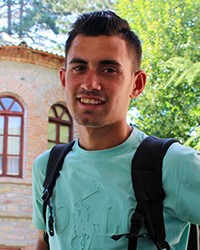Albanian in Kosovo

Photo Source:
Anonymous
|
Send Joshua Project a map of this people group.
|
| People Name: | Albanian |
| Country: | Kosovo |
| 10/40 Window: | No |
| Population: | 1,516,000 |
| World Population: | 5,797,000 |
| Primary Language: | Albanian, Gheg |
| Primary Religion: | Islam |
| Christian Adherents: | 2.00 % |
| Evangelicals: | 0.20 % |
| Scripture: | New Testament |
| Ministry Resources: | Yes |
| Jesus Film: | Yes |
| Audio Recordings: | Yes |
| People Cluster: | Albanian |
| Affinity Bloc: | Eurasian Peoples |
| Progress Level: |
|
Introduction / History
Ethnic Albanians are probably descendants of the Illyrians who were the original inhabitants of the western Balkan Peninsula. In the sixth century, migrating Slavs began to settle on Illyrian territory and pushed the Illyrians into what is present-day Albania. Since that time many have spilled over into nearby Kosovo, and these are now known as Kosovo Albanians. Both Kosovo and Albania were once part of the Turkish-based Ottoman Empire until it weakened in the early 20th century. After WWI ended, Kosovo was joined with small nearby countries to form Yugoslavia which became communist after WWII. Before the Communist Era, Albanians were a tribal people who lived in extended family units called fis. The fis had many old traditions, such as the vendettas, or "blood feuds," which often lasted for several generations. For protection during these feuds, families lived in fortified stone buildings called kulas. The ground floor of the kula was built with small slits rather than windows, while the upper floor had windows that could be closed. Because of a strong communist dictator, the ethnic groups in Yugoslavia remained at peace, but hostilities between the Serbs and the Albanians were always near the surface. It became violent in the 1990s as Yugoslavia dissolved into a number of smaller countries including Kosovo. The Albanians are divided into two major groups, the Gheg and the Tosk, according to which Albanian dialect they speak. Albanians in Kosovo are almost always Gheg. The Gheg are noted for their sternness and courage.
What Are Their Lives Like?
Albanians in Kosovo are poor with a high unemployment rate. Over half of the youths are unemployed. Most people live in small plots of land in rural areas trying to grow enough food to survive. Over two-thirds of Albanian women experience domestic abuse at some time; a situation that often comes with a depressed economy. The infrastructure is broken; electricity is available to only a few. Personal hygiene is poor, most likely because they don't have adequate safe water for drinking or bathing. There are not enough bathrooms for sanitation purposes. There are shortages of houses and medical facilities. Their courts are overloaded with a huge backlog of cases. Surprisingly, Kosovo is a relatively safe country with a lower crime rate than the countries surrounding it.
What Are Their Beliefs?
Centuries ago, most Gheg Albanians were converted to Islam by the Ottoman Turks. However, they practiced a type of folk Islam which embraced occult practices such as praying to the dead, seeking cures for sickness, and praying for protection from spirits and curses. Though ethnic Albanians have leaned towards the Sunni Islam they inherited from the Ottomans, a minority adhere to the traditional Orthodox forms of Christianity.
What Are Their Needs?
Like all other peoples in Kosovo, the Albanians need their economy to improve. Kosovo is the second poorest country in Europe, with only Moldova being poorer.
Prayer Points
Pray for the Lord to raise up selfless believers to help the Albanians of Kosovo develop their economy so there will be adequate employment and a workable infrastructure. Pray for the Lord to give Albanians in Kosovo an abundant harvest as a sign of his power and goodness. Pray for an unstoppable movement of Albanian believers discipling others who will disciple still others.